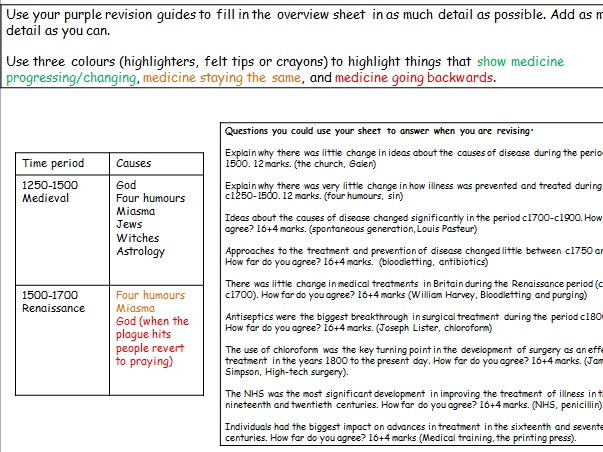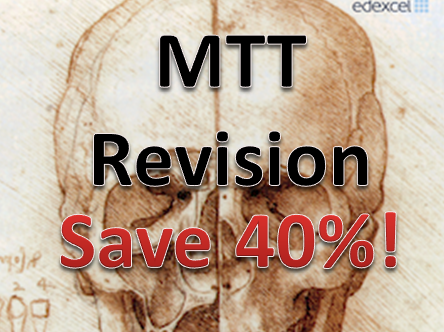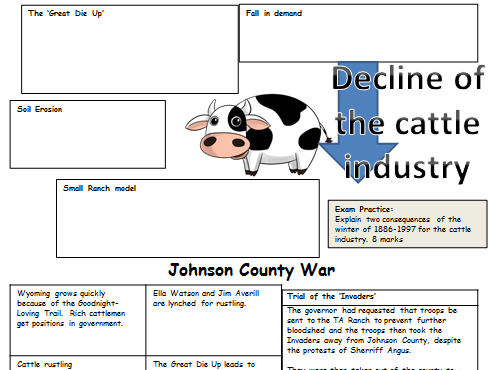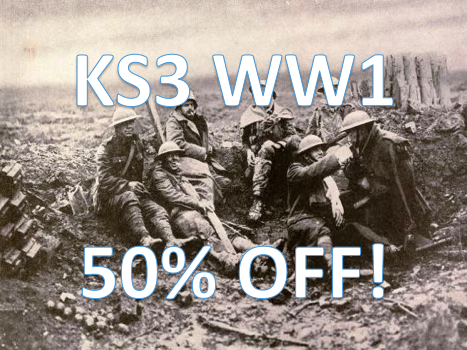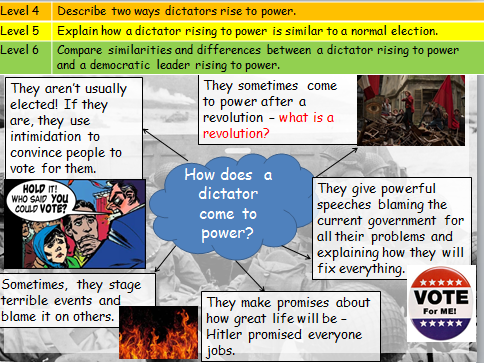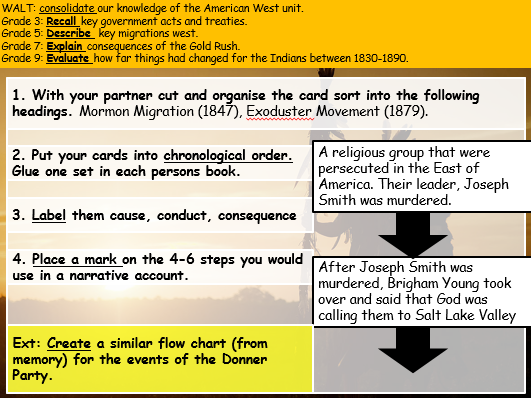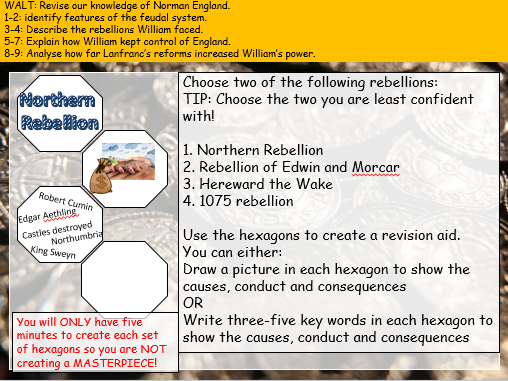
177Uploads
76k+Views
24k+Downloads
History

Edexcel 9-1 history command word descriptors
Examination command words created to support pupils with understanding expectations of all three papers.
Bundle

Key words bundle Edexcel history 9-1
Key words for the following units included:
Medicine Through Time
Historic Environment
Anglo-Saxon and Norman England
American West
Weimar and Nazi Germany

Medicine Through Time Overview Revision HW Edexcel History 9-1
This homework/revision activity is aimed at getting pupils to consider all of the content they have learnt over the course and get it onto one sheet. They then colour code progress, stagnation and regression to support with the explain why and how far do you agree questions. On the back of the sheet is a WAGOLL, instructions and some example questions for pupils to use to support their revision.
Aimed for use with the purple revision guides (pearson) but can be easily adapted for pupils to do from memory, or other revision guides that your school are using.

Poverty in Tudor England
Lesson aimed at KS3, poverty and the poor laws in Tudor England.
describe why people were in poverty
Define the terms able-bodied and impotent poor
Explain how these people were treated and why these categories were necessary at the time.
evaluate how fair these categories were and why.

Treaty of Versailles and how it affected Germany
This lesson allows pupils to explore the terms of the Treaty of Versailles and the affect that the terms had on Germany.
Pupils define key terms like League of Nations, Armistace, and Big Three.
define the term armistace
watch the video and record the terms of the TOV (green pen task follows)
Class creates a diamond 9 together, what had the biggest/smallest affect on Germany
Written task - was the TOV fair? fully differentiated, sentence starters and must/should/could.
Source examination - how useful question. Set as homework after discussing and beginning in class. Differentiated for HA/LA on the worksheets.
Homework attached as part of the lesson bundle. Differentiated for HA/LA how useful question using the execution of Germany source.
Bundle

Medicine Through Time Revision Bundle
Five sessions that cover revision for the Medicine Through Time unit.
Each session comes with a worksheet for pupils to create that they can take home to revise from.
Sessions include:
Medieval medicine 1250-1500
Renaissance medicine 1500-1700
Early Modern medicine 1700-1900
Modern medicine 1900-2000
WW1 Medicine in the trenches (Historic environment) 1914-1918

Cattle Industry (Rise and Decline): REVISION American West
Part of a series of revision sessions that provide pupils with an overview of the American West unit prior to examination.
As part of this revision session pupils will revise:
Changing role of the Cowboy
Rise of cattle industry and key individuals
Decline of the cattle industry
Johnson County War: Causes, conduct, consequences
Possible examination questions
Bundle

Indian Wars bundle (American West (Edexcel history 9-1))
This bundle includes lessons that cover the Indian wars as well as reservations.
The lessons include focus on cause, conduct and consequence in preparation of Paper Two (Edexcel 2016 specification). There is a focus on developing the skills required to answer the narrative account, importance and consequence questions.
Bundle

KS3 WW1 bundle
Four lessons that introduce KS3 pupils to WW1 whilst building skills towards KS4. Focus on analysis, evaluation and source work throughout the scheme of work.
Pupils will be introduced to propaganda as well as contemporary evidence from the period.

Elizabethan England: Who should marry Elizabeth I?
Suitors lesson in which pupils study ‘dating profiles’ before creating a speech to deliver to a ‘real life’ Elizabeth in a hot seat style activity. Pupils can then vote on who is the most convincing match or the pupil pretending to be Elizabeth can choose.
Pupils will explore reasons why Elizabeth didn’t want to marry and why her advisors pressured her to do so as well as exploring who wanted to marry her and why.
All tasks fully differentiated for LA, MA and HA.

WW2 Dictators
A whole lesson with worksheets and fully differentiated that compares Tojo, Hitler and Stalin.
Pupils identify what a dictator is and who the three men are
They describe/explain how a dictator is able to rise to power
Compare similarities and differences between the three men
Evaluate who changed the most things in their country and why we remember their atrocities rather than the positive changes they made to their countries.
I use this as an introduction to a unit on WW2 to provide pupils with some context into the political landscape of the world prior to the start of the war.

KS3 Invasion of Poland (WW2) Narrative account lesson
Pupils will explore the invasion of Poland with the aim of creating a GCSE style narrative account in preparation for the skills needed at KS4.
Pupils will:
examine the Munich Agreement and hypothesise how peopl e would react to it
Watch a video of the invasion and collect notes to be able to describe the invasion
Put the events of the invasion into chronological order using visual prompts for support
create a narrative account using a GCSE support sheet that allows development towards explaining why events lead to one another and cause change.

Edward the Confessor (Edexcel 9-1: Anglo-Saxon and Norman England)
This lesson is designed as a skills building case study to help introduce the Normans unit.
Pupils will be introduced to life in Saxon England and the power of the house of Godwin.
They will build towards answering a how useful question to embed paper one and paper three skills.
Gives later opportunity to compare when analysing the control of William. Edward didn’t raise taxes or take land from the earls, so a good link to allow pupils to understand why Saxons were so upset and angry following 1066.

End of unit consolidation, mock, and improvement lesson (Edexcel History American West 9-1)
Consolidation:
Pupils will match up key acts and treaties as a quick recall activity
Then they will create two narrative account timelines for Mormon and Exoduster movements.
Consider consequences of the Gold Rush before explaining in detail why each feature of the Boom Towns lead to law and order problems.
Finally, pupils will evaluate how far things had changed for the Indians using acts and treaties to explain whether there were any significant turning points.
Mock attached, follows next lesson.

I'm a Historian! Ice Mummies Investigation (What is history? (KS3))
This lesson is set up as a pupil led investigation, pupils explore the ‘cave’ to find as much evidence as possible before they run out of time. They then have to use they evidence they have been able to collect to work out what has happened to the Mayan ice mummmy - this lesson is part of a series of lessons that build upon use of sources, interpretations and finally a baseline assessment. These can be found separately or as part of a bundle in my tes shop.
WALT: Investigate the mystery of the ice mummies to come to a conclusion.
L3: identify questions historians need to ask in order to learn about the past.
L4-5: describe key features of the ice mummies and explain what you can learn about the ice mummies from the sources and what clues might mean.
L6: hypothesise what might have happened to the ice mummies.
L6: Create a narrative account analysing the experiences of the Ice Maiden and how she felt.

Source utility (What is history? (KS3))
This lesson builds on knowledge gained during the BIAS (WHAT IS HISTORY (KS3)) lesson which is available in my TES shop.
WALT: use sources to explore Mayan culture and explain how they are useful to a historian.
L3: Recall key facts we learnt last lesson about the Mayans.
L4: describe two things you can infer from a source.
L5: explain why sources written by the Spanish are limited to a historian.
L6: Evaluate sources written by the Spanish to explain why they are useful as well as limited.
Pupils use sources to develop skills to analyse utility. Pupils are provided by WAGOLLs and heavy support to enable them to access the skill - worksheets are available for LA, MA and HA.

Baseline Assessment (What is history? (KS3))
This baseline assessment follows the conclusion of the ‘What is history’ scheme of work that can be found in my tes shop. It is set up to mimic the question types of Paper 3 Edexcel 9-1.
This assessment includes all interpretation type questions - 3b, 3c, 3d.
Bundle

Edexcel 9-1: Anglo-Saxon and Norman England
A bundle of fully differentiated lessons.
Lessons build into a scheme of work for Paper Two Anglo-Saxon and Norman England.
Pupils are given the opportunity to be supported through effective differentiation every lesson and challenged through tasks ranging up to a grade nine every lesson.
There are a variety of WAGOLLs included to give pupils model answers to work from, all tasks are responded to through AFL and there are several longer written responses included to allow teachers to mark pupils written communication.
I have included some revision sessions (labelled REVISION) as a bonus.

The Weimar Constitution (Weimar and Nazi Germany (Edexcel 9-1))
This lesson is part of a unit of work that explores Paper Three, Weimar and Nazi Germany.
Pupils will:
Identify the meaning of the word constitution (using a Freya Model grid)
Describe what the constitution consisted of (see capture, paired task - version of worksheet as a gap fill for lower ability students)
Explain the advantages and disadvantages of the constitution - includes AFL on slide
Develop use of judgement: includes WABOLL, structure strip for LA and differentiated task.

Treaty of Versailles (Weimar and Nazi Germany: Edexcel 9-1)
Students will:
Identify the terms of the treaty of versaille watching a video and completing a worksheet
Describe whether the terms were fair - guided think pair share activity
Explain how to answer question 3d through use of examiners mark schemes
criticise a model answer to demonstrate what their own work should include
attempt a PEEL paragraph of their own using an interpretation.



